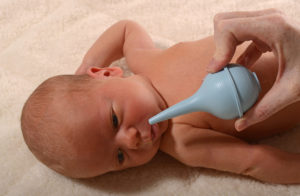Breastfeeding When You or Your Baby are Sick
 Breastfeeding when you or your baby are sick may be a challenge, but there are rarely any cases of illness requiring that you quit breastfeeding. And, just as this is true for mom, there are very few illnesses which should prohibit your baby from nursing. While all of this is well and good, it doesn’t always mean that breastfeeding during times of illness is easy. Here’s a few tips for keeping up your breastfeeding routine while you or baby are sick.
Breastfeeding when you or your baby are sick may be a challenge, but there are rarely any cases of illness requiring that you quit breastfeeding. And, just as this is true for mom, there are very few illnesses which should prohibit your baby from nursing. While all of this is well and good, it doesn’t always mean that breastfeeding during times of illness is easy. Here’s a few tips for keeping up your breastfeeding routine while you or baby are sick.
Breastfeeding When Mom is Sick
Common illnesses like the cold, flu, and mastitis don’t necessitate a reason to quit nursing. Blood borne illnesses such as HIV are some of the rare reasons a mother may not be able to nurse. Other illnesses requiring invasive or strong medicinal treatment such as cancer may also keep a mother from nursing. Still, in the vast majority of cases, you can be sick and nurse your baby!
The rule of thumb when you’re sick and nursing your baby is to rest, rest, rest-and drink plenty of water. You may be tired and dehydrated while ill, especially if you are feverish or have got a gastrointestinal bug which causes vomiting or diarrhea. Getting plenty of rest can be tough if you’ve got a newborn, so enlist the help of your partner, family, and friends. Keep your baby close by so that you don’t need to get up and move around to nurse your baby. Instead, practice room sharing while you’re sick if you don’t practice it already. If you’re physically weak, try nursing your baby on your back with them laying against your stomach so that you don’t have to hold them.
If you’re worried that your breastfeeding baby will catch your illness through your milk, don’t worry! Usually, when an illness sweeps through the house, the breastfed babies are the luckier ones and don’t get sick. If your baby does fall ill, their case of the illness will likely be very mild. Why? You’ve passed antibodies designed to fight the illness to your baby through your breast milk keeping their immune system robust in spite of infection.
Now, just because you’re providing your baby with antibodies through your milk doesn’t mean that you should practice techniques to protect your baby in other ways. Wash your hands frequently, especially before handling your baby and keep your sneezes and coughs away from your infant.
Breastfeeding When Baby is Sick
Breastfeeding should not only continue when your baby is sick but nursing sessions should be increased in frequency. Breast milk provides your baby with tons of nutrients that will pump up their immune system so that their stint of time spent being sick will be shorter and a bit easier to manage. Sometimes breastfeeding is tough because your baby is congested making breathing more difficult while nursing. To combat this tricky situation, keep a humidifier handy in the room where your baby is sleeping and purchase some saline nasal spray. It’s also helpful to breastfeed your baby while they’re sitting upright.
It’s important to keep a close eye on your baby to ensure that they’re not at risk for dehydration. If your baby is struggling to nurse, has a temperature greater than 101 degrees Fahrenheit, or is noticeably lethargic.
Know the signs and symptoms of dehydration in an infant so that you’ll have no doubt when it is time to bring your baby into see the doctor. Some of these symptoms include:
- Dry mouth. You may notice your baby isn’t drooling, has chapped lips, or a noticeably dry mouth.
- Sunken eyes or top of the head. A dehydrated baby may have sunken eyes or a dip in their “soft spot” also known as a fontanel.
- Lack of tears. A dehydrated baby may not be able to make tears when they cry.
- Tenting of the skin. This phrase refers to a decreased elasticity in your baby’s skin. If you gentle pull or pinch your baby’s skin it should naturally fall back into place. In a dehydrated infant, that pulled or pinched skin may take longer than normal to return to normal. This is known as “tenting.”
- An abnormally grumpy baby displaying other signs of dehydration may be another sign of dehydration.
- Lack of energy, decreased movement, or abnormal sleepiness is also an indicator of dehydration. Lethargy is a serious symptom. If you notice this in your baby, bring them to their pediatrician.
Whether you or your baby is sick, rest and hydration is the cornerstone to getting your health back. Nurse frequently, drink plenty of water, and use this period as a way to rest and connect with your baby.
